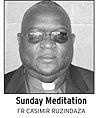The liturgy of our second Sunday of Advent whose readings are Isaiah 11:1-10; Psalm 72; Romans 15:-13; Matthew 3:1-12, is a call for an inner change of the entire person.


The liturgy of our second Sunday of Advent whose readings are Isaiah 11:1-10; Psalm 72; Romans 15:-13; Matthew 3:1-12, is a call for an inner change of the entire person.
These readings stress the basic Christian insight that self renewal can bring a fundamental transformation in the life of an individual believer. The same readings remind us the central theme of this period of advent which is a call for a change of heart.
This kind of change is not simple for us; because it requires re-examining our personal appreciation of what we have always judged to be important in our life; and have the courage to make some adjustment where it might be necessary.
It might involve some kind of conviction we have built up for many years or some opinions that are hard to change.
This period of Advent requires us to take a serious stock of our life and at the end change for the better. That kind of inner change in our heart was the mission of John the Baptist as he called upon his contemporaries in the following words: "Repent, for the Kingdom of God is close at hand…Prepare a way for the Lord, make his paths straight.” Mt 3:3ff.
Every realistic person knows from his or her life that change may be painful experience as Joan Wallach Scott, the famous historian tells us: ‘Those who expect moments of change to be comfortable and free of conflict have not learned their history’.
In biblical terms, that kind of change is referred to as metanoia as we find it in John’s call to repentance and his baptism which should be seen against the background of a prophetic tradition which looked to the wilderness for the unveiling of God’s final revelation.
In this period of Advent, that emergence of wilderness which accompanied the message of the Baptist should be our own experience today. We too should take our period of Advent as some sort of wilderness where we take time to examine our conscience and see how we standard before our God as we prepare to welcome his only Son in our hearts and homes.
In our Advent experience of wilderness, the words of Jesus in Mat 3:1 ff, speak to us in a very relevant way to the situation we are living today in our nation and in our region at large: " The kingdom of God is at hand,” "Repent and believe the Gospel.”
It is true that these two phrases might mean different things to different people, but a closer attention reveals to us that they are practically a summery of the Christian life.
Our Christian life style is practiced on earth as constant penitents because of our human limitations, but our vision should be heavenly because we have the kingdom of God as our priority. And this requires of us a constant self readjustment.
Christ who always practiced what he preached, spent forty days and nights in prayer and fasting, before he began his ministry. When he calls us to repent, he is telling us that it is through metanoia that we can approach the kingdom; by that inner change of the entire person in thought, judgment and behavior.
This is a change effected under the impulse of the holiness and charity of God as they are revealed and given to us in the Son. During this period of Advent, Christ’s call for metanoia is all the more compelling for the fact that he does not merely preach it, but is himself the example of it.
In fact, Christ is the most telling example for penitents, for he decided to suffer not for his own sins but for our sins. By this example Christ teaches us that we too must carry the cross which the flesh and the world might inflict on the shoulders of those who seek to follow in his foot prints.
Today we may ask ourselves the relevance of this call for penance in our modern situation; with people busy bettering their situation from all possible aspects!
Does such a call for an inner change of heart concern the just person who dedicates his or her life for the service of human kind?
That is exactly what the call is all about; there is room for improvement for all as we fix our eyes on the life to come. In fact, this hope in life to come adds both value and meaning to our present life.
That hope and faith give us new motives for fulfilling our earthly duties. When, on the other hand, man is without this divine reference his or her dignity is deeply wounded and becomes restless.
This proves St. Augustine’s words right who stated that we are made for God and our hearts remain restless until they rest in Him.
Ends


